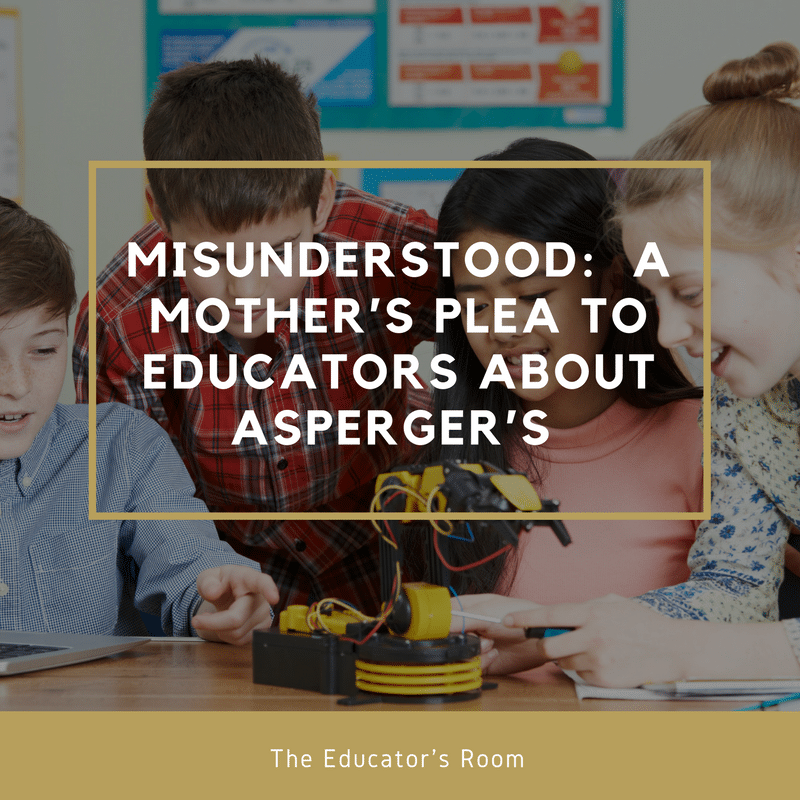In part one of this series, I shared my story as a mother to a son with Asperger’s Syndrome and my “wish list” for educators who work with such students. Although I am a teacher, my training in working with Asperger’s children was on the job experience, as my now almost twenty-year-old son has struggled his entire life with this disability. But, as I mentioned in my previous post, there is much more to the story; much more than I could share here. Let me tell you the end of the story and offer specific strategies teachers and parents can use to help Asperger’s children and teens learn appropriate social skills.
By the time my child ended his eighth-grade year he was miserable, had no friends, was depressed, anxious, and created conflict no matter where he was. He was not responsive to therapy even though we had found a counselor who was working on her doctorate degree and had clinical experience treating teens with Asperger’s. In short, he did not seem to want to get better, no matter what strategies were presented to him, no matter how much we reasoned with him, no matter how much we tried to explain that things would get better, but that he had to do his part. In retrospect, I get it now. He was so miserable and wanted so desperately to escape and avoid his pain. To talk about the reality of his chaotic life was too much. In addition, those with Asperger’s often exhibit immature emotional and social abilities and age-appropriate coping skills. So even though my son was rather large for his age, was well read, and appeared to be an extremely bright and articulate young man, his emotional maturity was well below what would be expected to be “normal” for his age.
It took four years for my son to make noticeable progress. By the time he graduated from high school at the age of eighteen, I barely recognized him. Gone was my awkward son who just a short while ago seemed to be mad at the world, seemed to agitate anyone and everyone, and who was not functioning in most social situations. He attended a four year private high school where the class sizes were extremely small, where he was able to make a fresh start, where he was around other teens who shared his passion for knowledge and for developing their intellect. The academics were rigorous, the expectations were high, and the school worked hard to foster a structured, loving, and accepting community of learners.
My son thrived and blossomed in this environment. He just finished his first year of college and did exceptionally well. There are still bumps in the road, but I am amazed at his progress in just four years. I share this to offer those of you hope and encouragement if you are struggling with parenting or educating a child with Asperger’s. The road you travel is long, lonely, and seems infinite. Every child’s story is different, but here are my suggestions for teachers (and parents too) based on my experiences.
Recommendations for Working with a Child with Asperger’s
- A team approach to treatment is a must. Teachers are part of the team, but so are parents, the child, the guidance counselor, the special education teacher (if the child has an IEP or 504 plan), the private therapist and/or the psychologist, and the pediatrician. I would recommend that the child has a mentor at school who can explicitly teach appropriate responses and social skills, allow the child to practice and role play various social interactions, interpreting body language, and offer encouragement.
- Realize that these kids need to learn the rules of conversations such as when to talk and when to be quiet. They tend to want to dominate conversations by focusing on an area of self-interest. Some kind of cue, such as a hand gesture, can be used by the teacher to tacitly communicate to the student that they need to be quiet or stop talking.
- It often appears as if these children do not have good manners. They can be impulsive, often blurting out and saying exactly what is on their mind. Coupled with the fact that many with Asperger’s view the world as black and white, they do not understand why their words were inappropriate. If what they think is true, they do not understand why they cannot say it. For example, my son would often “correct” teachers and other students in a manner that seemed to be critical, rude, and arrogant. Punishing him would only exacerbate the situation. Instead, pull the child aside, repeat what they said, and explain very simply that what they said may be true, but that it is offensive to verbalize.
- Gradual transitions are a must to ease anxiety. If change is on the horizon, help the child to prepare by giving as much warning as possible and to discuss in small chunks what will be expected. A change in a school schedule, such as a fieldtrip can be upsetting to the Asperger child.
- Speaking of recess, unstructured times can be very difficult. Recess, lunch, “specials” (gym, art, music), assemblies, guest speakers, etc., can cause anxiety about the social expectations. My son preferred to read during lunch rather than interact with his peers. And when he did socialize, it often resulted in arguments and conflict. He needed on-the-spot practice and training in how to relate to his peers during these times.
- These children are prone to depression, anxiety, suicidal thoughts, low self-esteem, and behavior issues. Meltdowns and even temper tantrums can happen in and out of the classroom. Provide a place in the classroom for the child to regroup when they feel overwhelmed, allow them to visit their mentor (e.g., the guidance counselor), or take a trip to the water fountain. Students need to be aware of their behavior, why it is inappropriate and learn to control and change their behavior. Again, the child’s mentor and therapist can offer cognitive and behavioral strategies as well as role-playing with the child.
As a strong advocate for the “chunk and chew” instructional strategy, I will leave you to “chew” on these strategies until next time. Have you implemented any of these strategies with success?[/fusion_builder_column][/fusion_builder_row][/fusion_builder_container]






Leave a comment